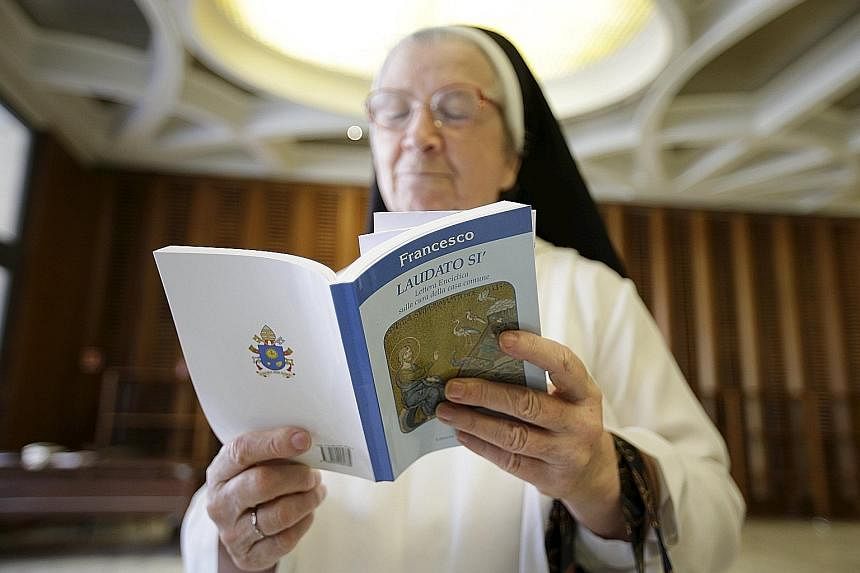NEW YORK - When an elderly Pope Leo XIII released a document in 1891 on the rights of workers to unionise and of owners to hold private property, European capitalists and socialists alike cried foul. Why should we listen, they fumed, to a pope's pronouncements on economics and politics?
Now, 124 years later, Pope Francis has set off an uproar over his document on the environment and the threat of climate change, an encyclical released on Thursday called "Praise Be to You: On Care for Our Common Home", or Laudato Si in Latin.
Once again, industrialists, politicians and critics are fuming, contending the Pope should stick to religion.
"Pope Francis' message on global warming was a confusing distraction that dilutes his great moral authority and leadership at a time when it is desperately needed to combat real - and present - crises in the Church and in Western culture," said Mr Richard Viguerie, who pioneered the use of direct-mail fund-raising to help build the political and religious right.
But Pope Francis is following in the footsteps of popes and bishops who, for generations, have written documents on pressing social problems by applying religious teaching to events so contemporary that they seem ripped from their eras' headlines.
Pope Leo's encyclical "On the Condition of Labour" - Rerum Novarum - became the seminal document in what is now recognised as modern Catholic social teaching.
Yet there have been many since then. Pope John XXIII warned of nuclear annihilation in Pacem in Terris in 1963. Paul VI challenged wealthy nations to help develop poor nations in Populorum Progressio in 1967. Benedict XVI noted economic inequality from globalisation in Caritas in Veritate in 2009.
Still, Pope Francis' encyclical, contends Mr Austen Ivereigh, a papal biographer in England, "is the most significant Catholic social encyclical since the first, Rerum Novarum, in 1891, and it's very much within that tradition".
What distinguishes Laudato Si from previous church documents on the environmental crisis, Mr Ivereigh said, is that it is intended to provoke action - to cause an enormous "conversion" in how human beings understand their place and responsibility to a planet that is in peril.
"We all know this is happening; the Church has been talking about it for a long time," Mr Ivereigh said, paraphrasing Pope Francis on environmental destruction. "Yet we do nothing."
In Laudato Si, the Pope puts forward a profoundly theological document, grounded in Catholic teaching, but one in which spiritual and secular matters are knit closely.
Throughout the paper, as he might in a recurring chant, the Pope intones that everyone and everything is connected - to God, to creation, to fellow human beings.
"As believers, we do not look at the world from without but from within, conscious of the bonds with which the Father has linked us to all beings," he writes.
"Christian spirituality proposes an alternative understanding of the quality of life, and encourages a prophetic and contemplative lifestyle, one capable of deep enjoyment free of the obsession with consumption."
Among those presenting the encyclical at a Vatican news conference on Thursday was an Eastern Orthodox theologian, Metropolitan John Zizioulas, who said "the ecological crisis is essentially a spiritual problem".
"The proper relationship between humanity and earth has been broken by the fall, both outwardly and within us. This rupture constitutes what we call sin," he said.
"The Church must introduce in its teaching the sin against the environment. The ecological sin."
NEW YORK TIMES

